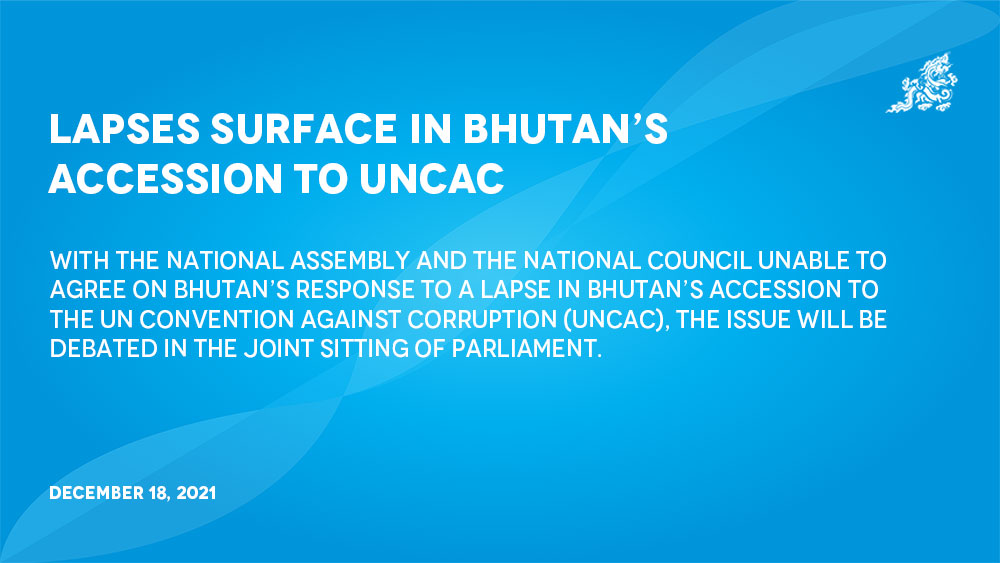Tashi Dema
With the National Assembly and the National Council unable to agree on Bhutan’s response to a lapse in Bhutan’s accession to the UN Convention Against Corruption (UNCAC), the issue will be debated in the joint sitting of Parliament.
The two houses of Parliament had ratified the UNCAC in 2015 with reservation on Article 66 (2) of the convention, which states that any dispute between two or more State parties on the interpretation or application of the convention that cannot be settled through negotiations within a reasonable time may be referred to the International Court of Justice.
The reservation would mean that Bhutan is not bound by the Article. Of the 140 UNCAC signatories, over 40 countries have conveyed reservations on the article.
When the Ministry of Foreign Affairs realised that it had failed to register the reservation while submitting the convention to the Office of the United Nations Secretary General on September 21, 2016, the government had tried to register the reservation for three consecutive years but could not do so because two member countries, the Netherlands and Finland, raised objections.
Foreign Minister, Lyonpo Tandi Dorji, said that the ministry consulted agencies and found two options: either revoke Parliament’s earlier reservation and include it in the law of the country, or denunciate the former accession and re-accede with the reservation.
The National Assembly discussed the UNCAC during the fifth session of the Third Parliament in June this year and revoked the previous Parliament’s reservation and sent it to the NC. However, the NC members disagreed with the NA’s decision and also demanded accountability for what it called a “serious lapse”.
Lyonpo Tandi Dorji said revoking the parliament’s earlier decision could resolve a lot of problems but there were reservations about going to the International Court of Justice. “But Bhutan is already subjected to the ICJ’s jurisdiction like the International Convention Against the Taking of Hostages, International Convention on Suppression of the Financing Terrorism, and many other human rights conventions.”
He said revoking the earlier decision would also help the Anti-Corruption Commission in the smooth functioning of its activities.
According to the minister, denunciation and re-acceding with the reservation would entail additional cost and also risk a negative image for the country, as Bhutan has not done it in the past. “It will hamper ongoing work of the ACC with UNCAC and partner countries.”
He said it would also impact Transparency International’s corruption index of the country. “We have conducted many activities according to UNCAC. UNODC spent funds to implement the activities.”
However, the NC pointed out that revoking the earlier parliament decision would undermine the decision of Parliament and the supremacy of Parliament. “More importantly, Royal Assent to accede to the UNCAC, with reservation on 66 (2) was granted on 26h May 2016,” it stated.
NC members highlighted the importance of fixing accountability for the lapse on the responsible officials and agencies and demanded facts and figures on the funds spent to implement the activities. Members said that if accountability is not fixed now, civil servants would not take Parliament decisions seriously.
They also said it was a major lapse by the Ministry of Foreign Affairs to submit the convention without the reservation and revoking the earlier Parliament decision would show the country has no rule of law and respect for institutions.
Members said the process of denouncing and re-acceding to international treaties was neither unforeseen nor unprecedented, and denouncing treaties with the sole intention of re-acceding with reservations to circumvent the prohibition of late formulation of reservations is enshrined in Article 19 of the Vienna Convention on the Law of Treaties.
The NC rejected the NA’s amendment and proposed to denounce and re-accede to the UNCAC with the reservations on Article 66(2) to uphold national interest, the supremacy of Parliament, and set a strong precedent to show that decisions of Parliament cannot and should not be revoked to cover lapses of any kind.
NC members said the decision would enhance rule of law and bring about transparency and accountability, thereby strengthening good governance in the country. “The NC’s decision will ensure that similar lapses never occur in future.”
Lyonpo Dr Tandi Dorji said that he was equally surprised and concerned about the lapse. “We have done research from 2018 to 2020 and tried to find out who is accountable. Going by the findings, many are accountable, including those in the ACC and National Assembly Secretariat.”
The NA re-deliberated the issue on December 15 and rejected the NC’s proposal. It will be submitted to His Majesty The King to seek approval for a joint sitting.


